Treatment of Juvenile Offenders. Initiative Statute | ||||||||||||||||||||||
| Results | ||||||||||||||||||||||
|---|---|---|---|---|---|---|---|---|---|---|---|---|---|---|---|---|---|---|---|---|---|---|
| ||||||||||||||||||||||
 Results by county | ||||||||||||||||||||||
| Source: California Secretary of State[1] | ||||||||||||||||||||||
| Elections in California |
|---|
 |
California Proposition 21, known also as Prop 21, was a proposition proposed and passed in 2000 that increased a variety of criminal penalties for crimes committed by youth and incorporated many youth offenders into the adult criminal justice system. Major provisions of the proposition, as summarized by Attorney General of California are:
- Increased punishment for gang-related felonies; death penalty for gang-related murder; indeterminate life sentences for home-invasion robbery, carjacking, witness intimidation and drive-by shootings; and a new crime of recruiting for gang activities; and authorizes wiretapping for gang activities.
- Requires adult trial for juveniles 14 or older charged with murder or specified sex offenses.
- Elimination of informal probation for juveniles committing felonies.
- Required registration for gang related offenses.
- Designation of additional crimes as violent and serious felonies, thereby making offenders subject to longer sentences.
The proposition received considerable controversy and was subject to vigorous protests by youth and human rights groups. Judges also expressed concern that the law eliminated checks and balances inherent to juvenile fitness hearings, as it effectively placed the power to try juvenile offenders squarely in the hands of a district attorney.[2] Nevertheless, Proposition 21 was eventually passed. Opponents included the Californians for Justice, the Critical Resistance Youth Force Coalition, and the Ella Baker Center for Human Rights. Prop 21 received the support of 62.1% (4,491,166) of the voters while 37.9% (2,742,148) voted against the proposition.[3] Only the comparatively liberal counties of the San Francisco Bay Area voted by majority against the measure.
YouTube Encyclopedic
-
1/5Views:5 8559 37932 4353 233388
-
Flaws with the California Juvenile Justice System
-
Part 1: Prop 36 Amendments to California's 3 Strikes
-
Angela Davis: Wars Against Women- Past Present and Future?
-
Euclid's Elements Book 1: Proposition 36, Parallelogram Area 2
-
Ballot Proposition Pros and Cons
Transcription
Results of vote
In February 2001, state Court of Appeal in San Diego invalidated provisions of the law requiring 14- to 17-year-olds to be tried in the adult courts.[4]
References
- ^ "Statement of Vote: 2008 General Election" (PDF). California Secretary of State. December 13, 2008. Archived from the original (PDF) on May 6, 2013. Retrieved June 26, 2013.
- ^ Ribner, Neil G. (17 February 2003). California School of Professional Psychology Handbook of Juvenile Forensic Psychology. John Wiley & Sons. p. 86. ISBN 978-0-7879-6778-9. "Proposition 21, passed by California voters in 2000, made changes to California's Gang Violence and Juvenile Crime Prevention Act. The major change affects the way in which decisions are to be made about whether to prosecute a juvenile in juvenile court or adult court. Prior to the passage of Proposition 21, juvenile court judges made these decisions. After the proposition was passed, courts no longer had this discretion. Decisions whether to try youths as adults have fallen in to the hands of district attorneys. Some judges in California have spoken out about their belief that this change in the law removes the checks and balances inherent in a judicial review of such decisions."
- ^ March 2000 State Ballot Measures
- ^ Court Curbs New Youth Crime Law, Retrieved September 12, 2015
External links
